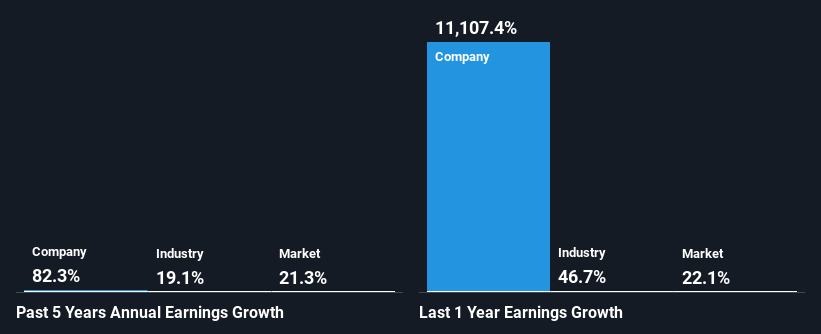Ramky Infrastructure (NSE:RAMKY) has had a rough three months with its share price down 32%. But if you pay close attention, you might gather that its strong financials could mean that the stock could potentially see an increase in value in the long-term, given how markets usually reward companies with good financial health. Specifically, we decided to study Ramky Infrastructure’s ROE in this article.
ROE or return on equity is a useful tool to assess how effectively a company can generate returns on the investment it received from its shareholders. In other words, it is a profitability ratio which measures the rate of return on the capital provided by the company’s shareholders.
Check out our latest analysis for Ramky Infrastructure
How To Calculate Return On Equity?
The formula for return on equity is:
Return on Equity = Net Profit (from continuing operations) ÷ Shareholders’ Equity
So, based on the above formula, the ROE for Ramky Infrastructure is:
76% = ₹13b ÷ ₹18b (Based on the trailing twelve months to December 2023).
The ‘return’ is the amount earned after tax over the last twelve months. Another way to think of that is that for every ₹1 worth of equity, the company was able to earn ₹0.76 in profit.
Why Is ROE Important For Earnings Growth?
Thus far, we have learned that ROE measures how efficiently a company is generating its profits. Depending on how much of these profits the company reinvests or “retains”, and how effectively it does so, we are then able to assess a company’s earnings growth potential. Assuming all else is equal, companies that have both a higher return on equity and higher profit retention are usually the ones that have a higher growth rate when compared to companies that don’t have the same features.
Ramky Infrastructure’s Earnings Growth And 76% ROE
To begin with, Ramky Infrastructure has a pretty high ROE which is interesting. Additionally, the company’s ROE is higher compared to the industry average of 12% which is quite remarkable. Under the circumstances, Ramky Infrastructure’s considerable five year net income growth of 82% was to be expected.
We then compared Ramky Infrastructure’s net income growth with the industry and we’re pleased to see that the company’s growth figure is higher when compared with the industry which has a growth rate of 19% in the same 5-year period.

Earnings growth is a huge factor in stock valuation. It’s important for an investor to know whether the market has priced in the company’s expected earnings growth (or decline). By doing so, they will have an idea if the stock is headed into clear blue waters or if swampy waters await. Is Ramky Infrastructure fairly valued compared to other companies? These 3 valuation measures might help you decide.
Is Ramky Infrastructure Efficiently Re-investing Its Profits?
Ramky Infrastructure doesn’t pay any dividend to its shareholders, meaning that the company has been reinvesting all of its profits into the business. This is likely what’s driving the high earnings growth number discussed above.
Summary
Overall, we are quite pleased with Ramky Infrastructure’s performance. Specifically, we like that the company is reinvesting a huge chunk of its profits at a high rate of return. This of course has caused the company to see substantial growth in its earnings. If the company continues to grow its earnings the way it has, that could have a positive impact on its share price given how earnings per share influence long-term share prices. Let’s not forget, business risk is also one of the factors that affects the price of the stock. So this is also an important area that investors need to pay attention to before making a decision on any business. You can see the 3 risks we have identified for Ramky Infrastructure by visiting our risks dashboard for free on our platform here.
Valuation is complex, but we’re helping make it simple.
Find out whether Ramky Infrastructure is potentially over or undervalued by checking out our comprehensive analysis, which includes fair value estimates, risks and warnings, dividends, insider transactions and financial health.
Have feedback on this article? Concerned about the content? Get in touch with us directly. Alternatively, email editorial-team (at) simplywallst.com.
This article by Simply Wall St is general in nature. We provide commentary based on historical data and analyst forecasts only using an unbiased methodology and our articles are not intended to be financial advice. It does not constitute a recommendation to buy or sell any stock, and does not take account of your objectives, or your financial situation. We aim to bring you long-term focused analysis driven by fundamental data. Note that our analysis may not factor in the latest price-sensitive company announcements or qualitative material. Simply Wall St has no position in any stocks mentioned.

